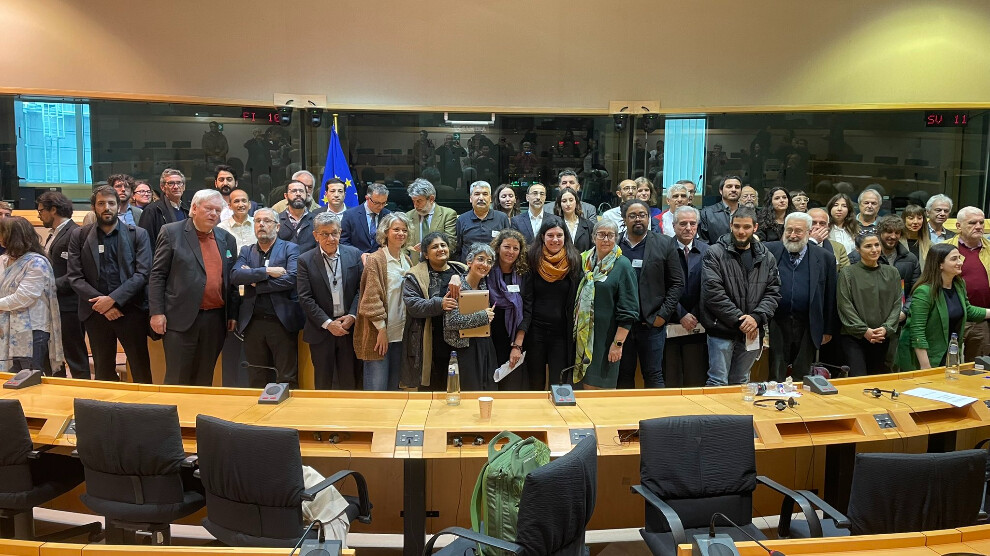Final resolution of conference on prisoners at European Parliament
"Political Prisoners: Isolation, ill-treatment and torture" conference ended with final resolution.
"Political Prisoners: Isolation, ill-treatment and torture" conference ended with final resolution.

A conference on the situation of political prisoners subjected to isolation, torture and ill-treatment was held in the European Parliament (EP) on Thursday.
Titled "Political Prisoners: Isolation, ill-treatment and torture”, the conference was organized jointly by the European Lawyers for Democracy and Human Rights (ELDH), European Democratic Lawyers (AED) and the Association for Democracy and International Law (MAF-DAD).
Following the conference held on April 11, 2024, the following determinations have been reached:
- Throughout Europe, particularly in Turkey’s prisons, the incidence of torture and ill-treatment in prisons is increasingly apparent each passing day. Observations indicate that isolation has been transformed into an execution regime, with arbitrary exile decisions punishing imprisoned families and relatives too. The components of the conference emphasize that torture and ill-treatment in prisons constitute a fundamental issue with serious socio-political consequences.
- The situation in the Basque Country, Catalonia, Hungary such as the discriminatory execution law affecting political prisoners, and the lack of hygiene conditions were among the topics discussed at the conference. Although not addressed due to time constraints, it is known that the situation in Greece is no different, especially concerning refugees, as in the United Kingdom and Germany.
- Turkey, which ranks among the countries with a very high number of political prisoners, indicates a more alarming picture in many respects. Through the authoritarian regime constructed by the AKP and its allies, the rule of law has been transformed into a fundamental instrument of political oppression. New administrative and legal techniques targeting political prisoners are being implemented almost daily in Turkey. Examples include new prison models, arbitrary and unnotified exile practices, burning of prisoners' executions on disciplinary grounds, revocation of all kinds of supervised release rights, access to healthcare, communication bans, to name just a few. Torture and ill-treatment have become a part of everyday life through tools such as strip searches and census practices widely implemented in prisons.
- An unprecedented example of isolation is being experienced at Imralı Island Prison. For the past three years, there has been no news from Mr. Abdullah Öcalan. This severe isolation practice, which is alarming for the Kurdish community, legal and democratic forces, is also a dimension of the intensified attack against the Kurdish people, including denial and annihilation. Isolation and the war targeting Kurdish people manifests as different aspects of the same political approach. The struggle against isolation, which should be systematically conducted within the context of upholding human dignity, constitutes one of the most important dynamics of the struggle for peace and democracy, particularly in the context of Imralı Island Prison.
Conference components have decided, in view of the above findings and the worsening situation across Europe, that an effective, collective legal and political struggle against isolation and torture in prisons must be pursued.
In this context, conference participants call upon primarily the mechanisms of the European Union and the Council of Europe to:
- Take a more active stance and concrete steps to end the inhumane practices in Turkish prison conditions, the arbitrary execution regime targeting political prisoners, and the Imralı Island Prison, which has become the primary address for isolation torture.
- Monitor prison conditions in Hungary and take necessary steps to improve them.
- Intervene concretely against discriminatory execution regimes and other legislation in the Basque Country, Turkey, and other countries.
Additionally, a call is made to the CPT, especially concerning Imralı Island Prison, to fulfill its responsibilities more effectively in monitoring and addressing the deepening problems in European prisons.
Conference participants have expressed their concrete views and suggestions during presentations and discussions and have decided to pursue a joint struggle in the following areas:
1. To establish a network initially consisting of conference participants and open to expansion to systematically and effectively conduct the joint legal struggle against isolation and torture.
2. The need for organizing a comprehensive and widely attended 2-day conference under the leadership of lawyers and legal organizations attending the conference to discuss the torture and ill-treatment experienced by prisoners in a broader context. Such a conference can facilitate discussions on legislation and practices in different countries and provide an environment where subjective views can also be heard. A working group will be formed to prepare for this conference.
3. In support of a petition submitted by 1,330 lawyers to the Ministry of Justice in Turkey in January 2024, calling for the end of the ongoing isolation at Imralı Island Prison and the provision of lawyer visits, a similar petition will be organized by European lawyers.
4. All lawyers and representatives of civil society organizations attending the conference have decided to work to sensitize their respective bar associations and international human rights and legal organizations to the problems of prisons.